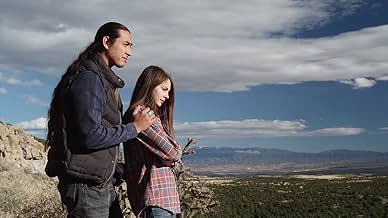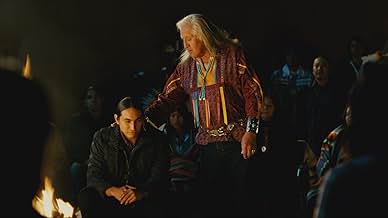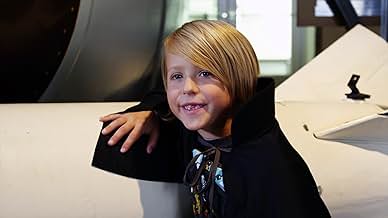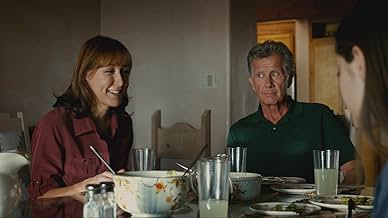IMDb RATING
6.3/10
2.1K
YOUR RATING
After Davey's father is killed in a hold-up, she and her mother and younger brother visit relatives in New Mexico. Here Davey is befriended by a young man who helps her find the strength to ... Read allAfter Davey's father is killed in a hold-up, she and her mother and younger brother visit relatives in New Mexico. Here Davey is befriended by a young man who helps her find the strength to carry on and conquer her fears.After Davey's father is killed in a hold-up, she and her mother and younger brother visit relatives in New Mexico. Here Davey is befriended by a young man who helps her find the strength to carry on and conquer her fears.
- Awards
- 6 wins & 1 nomination total
Barbie Robertson
- Danielle
- (as Barbie Anthony)
- Director
- Writers
- All cast & crew
- Production, box office & more at IMDbPro
Featured reviews
Tiger Eyes, a young adult book written by Judy Blume in 1981 and the first of her movies to be brought to the big screen, is about a young girl trying to cope with the murder of her father. Her son, Lawrence Blume wrote the screen play and directed the film. Willia Holland stars as Davey and Tatanka Means stars as Wolf, the young man who who helps Davey find strength from loss.
Despite the Boston International Film Festival playing an unfinished version of the film that lacked surround sound and the rich deep and moody color the directer intended, the movie was lushly filmed and used the landscape surrounding Los Almos New Mexico as a silent-yet-powerful character in the film.
What is rendered on the screen is a spare yet moving meditation on the solitude of grief and the redemptive power of connection. The film holds a few masterful moments that telegraph to our hearts and minds the experience of grief. Close to the beginning of the movie we are presented with a character's wish to rise up in a hot air balloon and never come down. Shortly thereafter Davey is alone, cradled by a New Mexico canyon, and calls out for her now dead father. The aloneness an isolation of death and loss are hauntingly personified in these two scenes.
The separation and isolation build in the movie and come to a sharp point before pivoting in a Native American ceremony with Wolf (Tatanka Means) and his father Willie Ortiz (Russell Means, Tatanka's real-life father). The ceremony teaches us that no one is left alone in this universe and that it is vital that we are not alone as we are social beings. Wolf's father says "if a person feels disconnected, he or she might fail." The movie starts to unwind itself and carry us to the ending as relationships move from contraction to expansion toward an emotionally satisfying ending. No one fails.
Blume's books are dense. She packs in many different facets of the young adult experience. The movie adaptation of Tiger Eyes is no different. In 92 minutes we are exposed to death, grief, teen drinking, teen relationships and dating, rebellion, angst, and more. I found myself wishing for a simpler more spare story line. The other issues presented in the movie, while important and well done, distracted me from the elegant beauty of relationships lost and found.
I think, perhaps, my wish of a more spare movie reflects my more adult tastes. I got to thinking about how young adults interact with media-- short bits of information. I wonder if that was Lawrence Blume's intention of the movie--to present short bits of information to a young adult audience in their own language. If that's the case, it was pure genius.
more: http://irreverentpsychologist.blogspot.com/2012/04/relationships- lost-and-found-tiger-eyes.html
Despite the Boston International Film Festival playing an unfinished version of the film that lacked surround sound and the rich deep and moody color the directer intended, the movie was lushly filmed and used the landscape surrounding Los Almos New Mexico as a silent-yet-powerful character in the film.
What is rendered on the screen is a spare yet moving meditation on the solitude of grief and the redemptive power of connection. The film holds a few masterful moments that telegraph to our hearts and minds the experience of grief. Close to the beginning of the movie we are presented with a character's wish to rise up in a hot air balloon and never come down. Shortly thereafter Davey is alone, cradled by a New Mexico canyon, and calls out for her now dead father. The aloneness an isolation of death and loss are hauntingly personified in these two scenes.
The separation and isolation build in the movie and come to a sharp point before pivoting in a Native American ceremony with Wolf (Tatanka Means) and his father Willie Ortiz (Russell Means, Tatanka's real-life father). The ceremony teaches us that no one is left alone in this universe and that it is vital that we are not alone as we are social beings. Wolf's father says "if a person feels disconnected, he or she might fail." The movie starts to unwind itself and carry us to the ending as relationships move from contraction to expansion toward an emotionally satisfying ending. No one fails.
Blume's books are dense. She packs in many different facets of the young adult experience. The movie adaptation of Tiger Eyes is no different. In 92 minutes we are exposed to death, grief, teen drinking, teen relationships and dating, rebellion, angst, and more. I found myself wishing for a simpler more spare story line. The other issues presented in the movie, while important and well done, distracted me from the elegant beauty of relationships lost and found.
I think, perhaps, my wish of a more spare movie reflects my more adult tastes. I got to thinking about how young adults interact with media-- short bits of information. I wonder if that was Lawrence Blume's intention of the movie--to present short bits of information to a young adult audience in their own language. If that's the case, it was pure genius.
more: http://irreverentpsychologist.blogspot.com/2012/04/relationships- lost-and-found-tiger-eyes.html
I asked my wife for her opinion before watching this movie. She told me that as a teenager she used to read all the Judy Blume books, and that it's probably more a movie for a younger audience. I gave it a shot anyway, and to be honest I regret it. It's a boring movie, and yes it's clearly something a younger audience will like more than the average movie watcher. I already had my suspicions when I heard that irritating slow piano music between scenes, it's a typical thing for bad movies. It's almost a signature for lame movies. I won't say the acting was bad, just average, but the story is one of those where you will fight to stay awake. Not for me.
Once again Willa plays a believable character. Not comic book genre. (Nothing against that genre). Very touching from start to finish. The acting and storylines compel the viewer's curiosity in the outcome of their lives. A follow up movie if written and directed by the same group of professionals with the characters played by the same actors...wow, a blockbuster. Really really moving. A growing up story for sure. Movies like these imprint a wonder of what's next. Like, don't end now! What does her future hold? And with who? The mental anguish of personal loss/suffering portrayed believable and saddening as it mimics life. Would watch it again.
Sadly, this film is proof that good books can't be always translated into good films.
To me, this film is nothing like the book. There is no mood set, the cast is totally wrong---the parents look like they could be the brother/sister of Davey, not parents. All poignant dialogue and scenes from the book are removed. There is no building of scenes, and they just did not translate grief except for a few brief moments. They moved and shifted characters and didn't have enough flash back sequences to unfold the mystery of Davey's grief, like in the book.
Sadly, I was thoroughly disappointed all around. The fact they changed the ending as well---nothing was done right--they showed no growth of Davey as we see in the book.
There are brief moments where you can really feel the grief, but sadly, with no build up, or even getting to know Davey, it falls too short.
To me, this film is nothing like the book. There is no mood set, the cast is totally wrong---the parents look like they could be the brother/sister of Davey, not parents. All poignant dialogue and scenes from the book are removed. There is no building of scenes, and they just did not translate grief except for a few brief moments. They moved and shifted characters and didn't have enough flash back sequences to unfold the mystery of Davey's grief, like in the book.
Sadly, I was thoroughly disappointed all around. The fact they changed the ending as well---nothing was done right--they showed no growth of Davey as we see in the book.
There are brief moments where you can really feel the grief, but sadly, with no build up, or even getting to know Davey, it falls too short.
Did you know
- TriviaTatanka Means, who plays Martin Ortiz (Wolf), is the son of Russell Means, the actor and American Indian Movement activist who plays Martin's father, Willie Ortiz. Russell Means died of esophageal cancer in 2012, after filming on this movie was completed but before the finished film was released. His character in Tiger Eyes also has cancer.
- Crazy creditsEnd Credits: "No lizards were harmed during the production of this motion picture."
- ConnectionsFeatured in The Space Between Kimberly & Amy Jo (2014)
- SoundtracksTexas in the Mirror
Written & Performed by Michelle Branch
Courtesy of Warner Bros. Records Inc.
By arrangement with Warner Music Group Film & TV Licensing
- How long is Tiger Eyes?Powered by Alexa
Details
- Release date
- Country of origin
- Official sites
- Language
- Also known as
- Kaplan Gözler
- Filming locations
- Production companies
- See more company credits at IMDbPro
Box office
- Gross US & Canada
- $27,160
- Opening weekend US & Canada
- $10,874
- Jun 9, 2013
- Gross worldwide
- $27,160
- Runtime
- 1h 32m(92 min)
- Color
Contribute to this page
Suggest an edit or add missing content





















